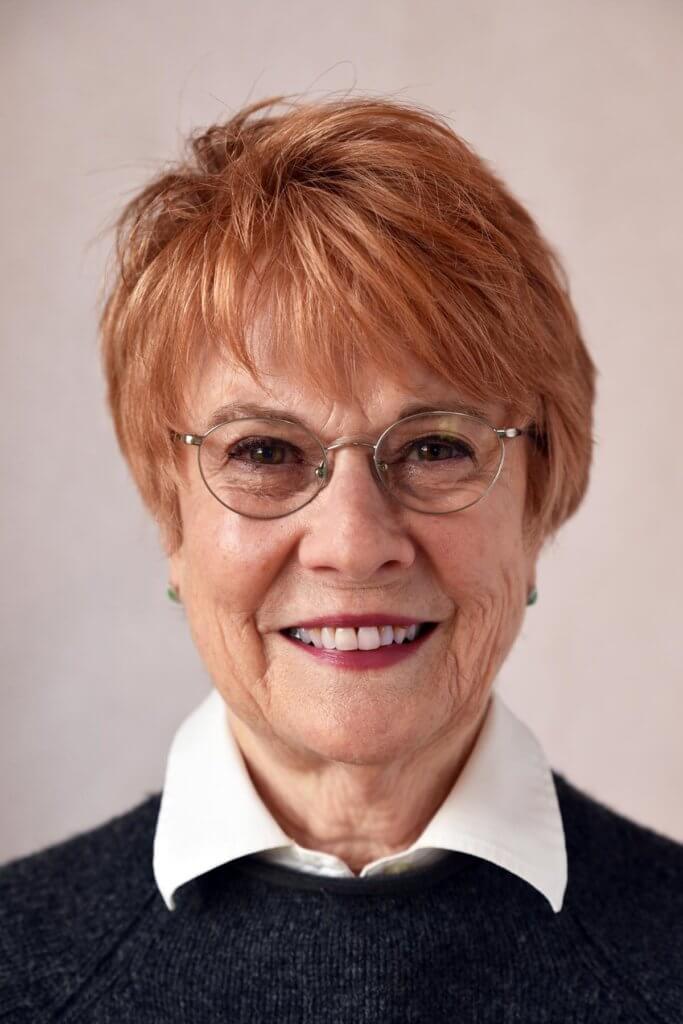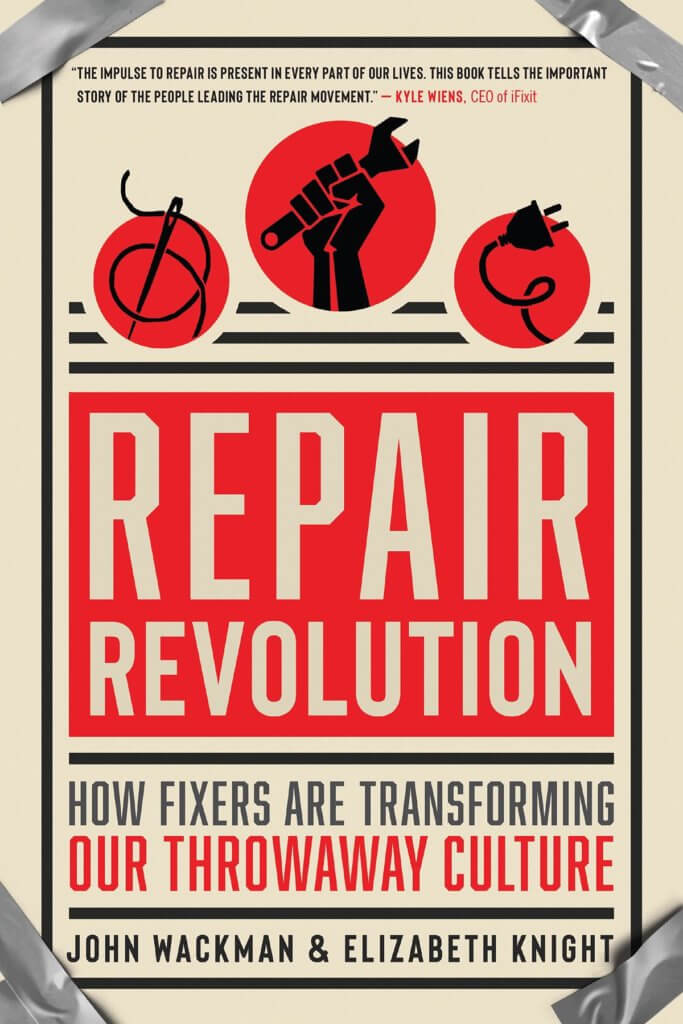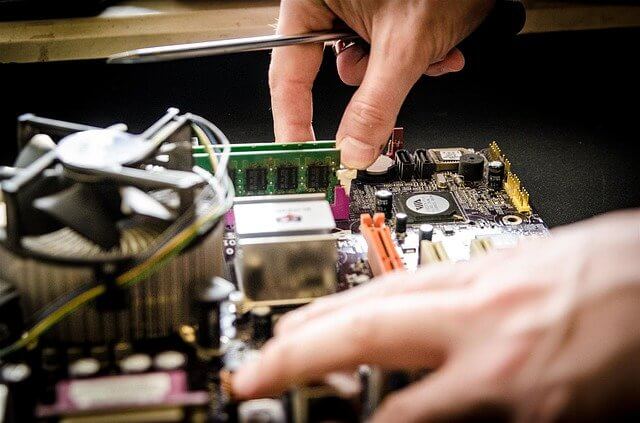TV producer and writer John Wackman founded the first Repair Cafe in New York. He lives in Kingston, New York. Community sustainability activist and organizer Elizabeth Knight is the author of Welcome Home and other books. She lives in Warwick, New York. More information at: www.repaircafeusa.org
What Kind Of People Volunteer To Be Repair Coaches?
Repair Coaches are friendly “fixperts” who volunteer their time and skills to help others repair their beloved, but broken items. Technical skills are important, but good repair coaches have other qualities as well: they are outgoing, good at listening and communicating. They like a challenge, enjoy learning new things, like sharing what they know, and feel a need to give back to their community. As Marica Canter says, “Volunteering is more rewarding to me than donating money to some cause.” Professionals who have their own repair, carpentry, contractor, or sewing business often volunteer at repair events because “It’s a great way to give back to the community, to provide an avenue for the community to get repair made at no cost to them, and a means of networking for future jobs for ‘Fixit Bob.’” Bob Berkowitz
Repair coaches tend to have been curious kids who took things apart for fun, often to the dismay of their parents. Others grew up in handy, frugal households where repairing things was a way of life. As Janette Nakada, of Lincoln Nebraska’s Repair Cafe organizers says, “my mother, my four aunts, and both of my grandmothers – with their hands, they expressed their frugality, intelligence, imagination, and love.“ Many other volunteers learned on the job or are self-taught.
Do you know the old adage, “Want something done? Look for a busy person”? It’s true. Employed or retired, repair people are often engaged in multiple community activities. Many of our repair coaches also volunteer at the local food pantry, with the PTA, as EMTs or in the Ambulance Corps or Red Cross, and with many other advocacy, networking, political, business, and social organizations. Across the USA, volunteers come from every walk of life and bring every skill set imaginable, including Airbnb hosts, artists, attorneys, authors, bakers, beekeepers, business owners, carpenters, chemists, career counselors, contractors, craftspeople, dads, electricians, engineers, firemen, grandparents, graphic designers, ham radio operators, homemakers, lawyers, locksmiths, massage therapists, mechanics, media producers, military veterans, moms, museum curators, musicians, nurses, pastors, plumbers, police investigators, professional organizers, psychotherapists, real estate agents, salespeople, teachers, students, school principals, seamstresses, social workers, television producers, tool- and diemakers, town board members — anybody! — everybody! — YOU!
Why Do They Do It?
In preparation for writing Repair Revolution, I sent a questionnaire to the organizer of every Repair Café, FixItClinic and Tool Library that I could find. One of the questions that I asked organizers and volunteers was, “why do you do it?” Here are some of their responses:
“I’ve been taking things apart and putting them back together since I was very young. I believe everything has a spirit and repairing things is a way to pay respect to the invisible source that animates all life.” Heidi Spinella, Coach.
People who volunteer all like the idea, as repair coach Tom Bonita says, “of keeping useful things useful and out of landfills.” “So many salvageable things are written off as garbage when all they need is some TLC, a switch or fuse here, a little darning-stitching there.” Don Shriner, Organizer, also shared this thought about the volunteers, “Our friendship extends well beyond the Repair Café. Most volunteers were strangers before and now are reliable friends.”
Librarian Gabrielle Griffis, who ran the FixItClinic, says “Repair is an act of resistance. It sends a message to manufacturers and corporations that shoddily made items are unacceptable. Keeping items out of the landfill is one of our major priorities, but it’s not guaranteed whereas learning is!”
“Repairing matters because it brings life to lifelessness… ‘I CAN’T’ isn’t always true, and at best people gain a skill which they are able to apply to help themselves, and maybe, eventually, others.” Dan Barkevich, Coach
Michelle, a Repair Cafe Organizer says, “I love marrying the philosophy of creating community with the practicality of teaching things.”“Repair Café is like a cross between Antiques Roadshow and the Island of Broken Toys! I’m grateful to be a part of it because it touches a lot of lives. That’s why I do it! Coach Ken Fixit Boscher
“I like it when people love the way a repair looks and they take pride in their patch or repair…They join the ranks of those of us who refuse to live in a totally throw-away culture.” Katy Banovic, Coach

How Do You Involve Kids?
At Repair Cafes, families are always welcome. And families volunteer. In Warwick, Jim Harper, a senior project manager for an engineering website, volunteers with sons Able (eight) and Eli (five) to man the Kids Take It Apart Table — putting things back together not required. “Our boys never complain about going to the RC. Able loves the time he spends at the table,” says his mom, Raheli, a volunteer mending and sewing expert.
The mother of a six-year-old boy says that when her son was only four, he took apart the family vacuum cleaner and put it back together all by himself. “We don’t have enough stuff for him to work on. He usually can’t sit still, but he hasn’t moved since he sat down at the kids’ table.” Pointing to Jim, who is explaining how a glowing miniature light bulb works, she adds, “I think he enjoys it as much as the kids!
Coach Rob Shaw, a systems administrator who works in tech support, brings along his fifteen-year-old daughter, Raven, and his twin, twenty-year-old sons, Nathaniel and Zachary to learn and help diagnose digital device problems. Many schools require kids to complete community service hours in order to graduate. Thirteen-year-old Ethan Bele, who needs volunteer hours to receive the sacrament of Confirmation from his Catholic church said this about his experience, “It’s nice to know that with the news saying so many sad and depressing stories, there’s a place where there are people who are willing to help you, no matter who you are, for no other reason than to help you in the best way possible. It gives me hope.”

What Kinds Of Things Do People Bring To Be Repaired?
The main categories of items that people bring to be repaired are small electrics, and household appliances such as lamps, toasters, blenders, clocks, vacuum cleaners, and sewing machines. Also, electronics and digital devices such as computers and phones, chipped crockery and broken glass, clothing and other textiles, soft and wooden toys, small-scale wooden furniture and picture frames, bicycles and dull knives, scissors, and hand tools.
What’s The Most Popular Item (s)?
Unlike the Netherlands, where the Repair Cafe was born, lamps, not coffeemakers, are the most popular item brought to US RCs. As one Warwick coach says, “It seems there are LOTS of people who love ugly lamps!” What’s wrong with them? Well, according to Warwick’s job tickets, from just one day, the problems include “flickers,” “fixture detached from base,” “won’t turn on — taken apart years ago,” “broken bulb socket,” “one side doesn’t work,” “doesn’t work when plugged in,” “wobbly base,” “two kittens chewed wire,” “three-way is a one-way,” “heater to lamp conversion,” “blown fuse,” “loose neck,” and “fell apart — put back together wrong?” The woman next in line announces, “See this? This is a dumb lamp! But it sits on my nightstand. I don’t want to have to spend eighty dollars on a new one just because I don’t know why this one doesn’t work.” She says that she heard about us from a neighbor who’d had her lamp repaired at the previous cafe.
Any Unusual Categories Or Services?
In addition to standard repair categories, the Repair Café held at the United Methodist church in New Paltz, New York, offers photo restoration, “wordsmithing,” a listening corner, and massage therapy. After a career at IBM, Don Grice volunteers to digitally repair damaged photographs. Vernon Benjamin, author of a two-volume history of New York’s Hudson River Valley, has been a writer all his life, “fifteen years in local journalism and thirty or more in public service.” Vern sits next to Don and “fixes sentences (résumés, cover letters, and other writing projects) for free. In addition to helping clients in their private practices, friends, and colleagues, Vallerie Legeay and Leah Stukes offer ten-minute chair massages, for neck, shoulders, and backs. Val says, “I have the sense that we can help repair the tissue and fabric of community, and it starts with people! Too often we throw ourselves away. Ourselves and others.”
Jo Gangemi, a practicing psychotherapist, approached the organizer of the Repair Cafe to suggest that active listening is a reparative and restorative act. Gangemi invites people who have brought broken items to be mended to heal themselves by sitting at her table and talking about whatever is on their minds for five minutes. “Have a seat. Tell me what you’d like to talk about. I’m happy to listen.” The Repair Cafe held at the Clinton Avenue United Methodist Church in Kingston, New York, has a “Soul Repairer” who takes time to talk, as well as a bilingual advocate who can help Spanish-speakers negotiate difficulties with school, banks, and government offices. In addition, this cafe offers the services of a book restorer, who can also “handle ceramics and other things that require glue and patience.
Several Repair Cafes have featured a dietitian from a local hospital who provided information about healthy snacks and dispenses samples. Other medical professionals have checked attendees’ blood pressure and cholesterol levels. Sponsors and representatives from organizations promoting green products, technologies, and community activities — like composting, solar energy, home energy audits, and free clothing swaps — often set up tables at Repair Cafes to present information. Some cafes have expert gardeners on hand to diagnose houseplant problems and offer advice on growing herbs and vegetables. Some Repair Cafes offer setup and repairs to stringed musical instruments such as guitars and mandolins. Other locations, especially those with a piano, flute, or guitar-playing volunteer, offer live music.
Can You Tell Us A Story About a Particularly Memorable Repair?
“I’ve been threatening/planning/hoping to go to one of the Hudson Valley Repair Cafes for three years,” recalled visitor Robin Romeo. She had been “holding onto broken things with a vague plan and then throwing them out.” Last week my paper shredder refused to shred a twelve-page booklet halfway through the process. I love my paper shredder. It makes junk mail almost as exciting as a check in the mail, so when I saw a Repair Cafe scheduled for the following week (miraculously), I went! Such a lovely community of people —impossible to tell from the look or the vibe, the difference between the owners of broken items and the angels there to fix them. After a brief and comfortable wait, I brought my paper shredder up to the table where the “guy who fixes stuff like that” sat. I handed over my shredder and he looked it up and down, adjusted his glasses, and then — without the slightest hint of irony — said, “You know you can replace these things for around eighty-nine dollars.” And then he fixed it! I can’t wait to break something again.”
Rich White, a guy who ‘can fix whatever anyone who has owned a home for fifty years can do,” and Roger Bergman, who owned a bicycle shop for forty-nine years, often team up. “R&R,” as we call them, are working on a multicolor, cast iron mechanical bank, circa 1907, that the owner says he gave to his son for Christmas. The action is supposed to involve Teddy Roosevelt pointing his rifle at a black bear cub hiding in a tree trunk, but nothing is happening. After R&R adjust a spring, the president and the bear are again able to play hide and seek. Immediately following that accomplishment, a man arrives with a heavy, metal cheese grater that he says he “Bought thirty years ago for one hundred and fifty dollars.” Problem? “The suction sucks — need to install new suction cup to secure it to table.” Our guys fix that, too. The delighted owner says, “Awesome, perfect!” Roger quips, “Now you can make America grate again.
How Do I Get A Repair Cafe In My Town?
Visit
If you’d like to start a community-based repair event, begin by visiting an existing cafe, clinic, or collective. To search for a location near you, check the organization’s website, Facebook page, or blog. Expect to devote a couple of hours to wandering from table to table to observe what types of items people bring to be repaired, and to witness the interaction between the public and all the volunteers — friendly greeters, traffic flow managers, and repair coaches. Better yet, bring something that needs to be fixed so you can experience the process firsthand, from check-in to check-out.
Look For Volunteers
Think of the search for volunteers as a passport to parts of your community you might not have known otherwise. Look for friendly folks with significant repair skills. Ask family, friends, neighbors, co-workers — anyone and everyone you know — to recommend handy men and women, especially those who have successfully fixed items for them. Professionals who have their own repair, carpentry, contractor, or sewing businesses often volunteer at repair events as a way to network and promote their services to a wider audience.
Finding Partners and Sponsors
As you think about starting a Repair Cafe in your town, consider how partners and sponsors can help your efforts by offering a free location, legal and tax advice, insurance, financial support, publicity, and/or networking opportunities to help you find volunteers. The diversity of resources available to support you is astonishing. Contact sources in several of the categories listed below to find multiple partners, sponsors, and volunteers who can help make your efforts a success:
Local Government Officials and Programs, Libraries, Religious Institutions and other Faith-Based Organizations, Civic and Service Clubs, Schools, Colleges, and Universities, Retirees and Senior Associations, Historical Societies, Earth-Friendly and Reuse Events, Climate Smart Communities, Climate Action Coalitions, and Transitions Towns, Green Clubs, Businesses, and Nonprofit Organizations, Fablabs, Hackerspaces, and Makerspaces, TimeBanks, Habitat for Humanity ReStores, Thrift and Reuse Centers, among others.
Offer to Speak – Get It In Print
Business, social, service, and civic clubs and organizations are often looking for speakers. Contact the organizers of these groups in your town and ask to speak or present a PowerPoint program about your repair event. Always end your talk by asking people to raise their hands if they’re interested in volunteering; then ask them to add their contact information to a signup sheet. Leave behind your contact information with the organizer or the group’s secretary.
Write a press release and calendar listing that include the who, what, when, where, how, and why of your repair event. State that you’re looking for volunteers, include your contact information, and submit the release to local media, your town’s and the county’s recycling/solid waste management team; the mayor, town supervisor, and city hall staff; houses of worship; and schools, colleges, and universities. Post your press release on social media.
The Right Location
Repair Cafes can be found in all sorts of venues, but the ideal setting is a rent-free space on a main street in a walkable neighborhood a short distance from public transportation. Look for public and commercial spaces associated with your partners or sponsors, as well as locations such as libraries, houses of worship, senior centers, town halls, art centers, community centers, co-working spaces, historic houses, makerspaces, museums, even school gyms.

Repair Revolution: How Fixers Are Transforming Our Throwaway Culture
By John Wackman and Elizabeth Knight
Category: Sustainability / Home Repair * Pub Date: October 27, 2020
Price: $18.95 * Pages: 304 * ISBN: 978-1-60868-660-5





